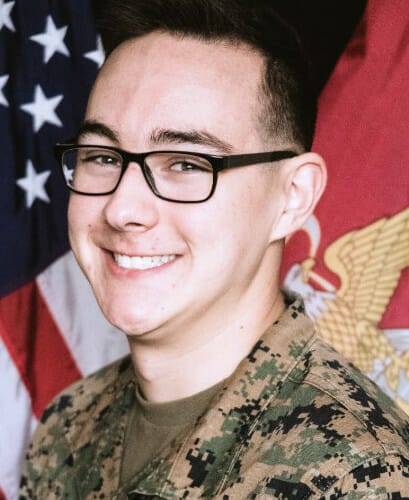Hunter Browning was in Marine Bootcamp, being verbally, mentally and physically beaten down when E. coli O157:H7 delivered a blow that made it impossible for him to build back up. “In the Marine Corps, I’m seen as the other. Being a recruit is derogatory until you finish training, you’re worthless. They break you down to build you up but it’s not fair if you don’t get built back up,” Browning said recently.
One of the victims of this outbreak was Hunter Browning, an 18-year-old Marine recruit. In October 2017 an outbreak of E.coli O157:H7 swept through the Marine Corps Recruit Depot in San Diego and Camp Pendleton.
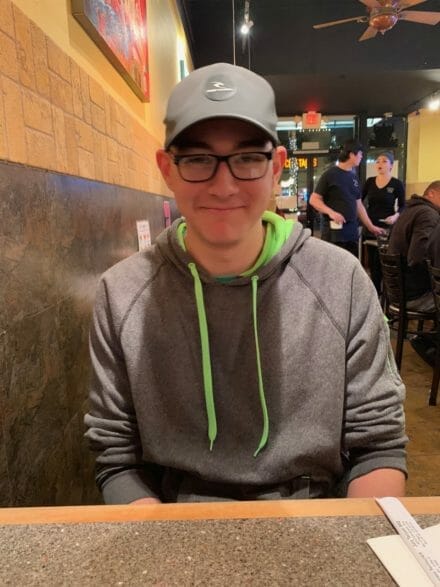
According to the Centers for Disease Control and Prevention, there were 62 confirmed cases, 62 probable and 120 suspected cases. Thirty people were hospitalized and 15 were diagnosed with HUS, a type of kidney failure known as hemolytic uremic syndrome. Patients’ ages ranged from 17 to 28 years with a median of 18 years.
Consumption of undercooked beef was linked to the outbreak and was traced back to a single ground beef supplier at the Marine Corps Recruit Depot in San Diego.
“What 20-year-old do you know with a full hip replacement?” Browning asked. Browning is dealing with the lifelong impact of food poisoning. “I don’t know how to deal with it. It’s not normal. When I tell people, they have a shocked look on their face and they pity me.”
In high school in Aberdeen, SD, Browning participated in drama clubs and skied in the winter. He graduated from high school in the spring of 2016. A call from a Marine recruiter convinced him that he was an ideal Marine recruit: fit, disciplined and bright. Browning was eager to challenge himself and gain the type of experience only the Marines could provide.
Boot camp
Browning took his first trip out west in the fall of 2017 to begin boot camp at the recruit depot in San Diego.
“I settled in pretty quick. I just went with the flow and tried not to screw up.” Browning said he made friends quickly, the group struggle bonding the recruits.
Marine boot camp is 13 weeks long. Browning thrived during the first phase of his training. It was not until his eighth week that he started to feel ill. “The first symptom I showed was a fever. And then later, I was getting stomach aches,” he said.
Browning described his symptoms as increasing severe.
“They make us do this exercise at night, where they had staff that was trying to invade our barracks building. Toward the end of the exercise, I started to get this pretty heavy fever.
Throughout the night, there had to be a group of four people up, making sure that nothing goes bad, or that none of the trainees leave. I was at the front post and you can’t leave when you’re doing that, and I really needed to go to the bathroom. I could feel diarrhea coming on or something. And I really needed one of the other guys to take the front post. They weren’t willing to do it because they thought I wouldn’t come back.
So, it wasn’t until after I got off fire watch that I was able to go to the bathroom, and it was definitely diarrhea. Before we left the barracks I had diarrhea again, this time it had blood.”
Browning said he had never experienced pain like that. He was afraid to tell the instructor, but he was in too much pain to not. The drill inspector sent Browning to the medical center but despite running tests, they could not figure out the cause of his illness.
He explained to medical personnel that he couldn’t eat, was throwing up and had bloody diarrhea. They took his temperature and thought he had the flu. They gave him an anti-diarrheal medicine — Pepto-Bismol — a solution that Browning now realizes was counterproductive if not harmful as his body tried to expel the E. coli.
Browning stayed in bed five days before returning to physical training. Despite the pain and fever, he pushed through his physical training. But when taking off his training clothes at the end of the day, Browning noticed his legs had swollen. He recalls the other trainees’ mouths dropping when they saw how large his legs had become, from his thighs to his feet. Browning was sent to the emergency room by ambulance.
In the emergency room, blood tests were run and Browning was told that he was suffering from hemolytic uremic syndrome (HUS) connected to Shiga toxin-producing E.coli.
Browning had heard of E. coli but had no idea what kind of damage it could do to his body. In just a couple of weeks, Browning says he lost more than 15 pounds, going from 165 to 149 pounds.
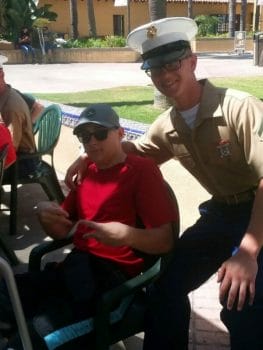
Contaminated food
Browning recalls in vivid detail the mess hall where he ate the burger contaminated with E.coli.
“You get your tray and your silverware, and then there’s a salad bar with a bunch of different salads or toppings for salads, and then after that, they have like a main course line, so between they’ll have like fruit sometimes, and in the morning they’ll have cereal, then the main course line where they’ll have the hot food,” Browning recalled.
“And then you go past and you take a left and go past the drink machines to sit down. Then you get back up to get a drink. It’s crowded and there’s always lots of yelling. It’s very stressful.”
These details are etched in Browning’s memory because of the strong emotions surrounding that day. Browning’s life was altered because of this mess hall, the food and how it was prepared.
“There are bouts of anger, of very extreme feelings toward my situation. Because it could have been different in so many ways. If the food was cooked properly. I would be out doing my job in the Marine Corps,” he said.
The military officials held tight to the investigation process and information about it, so it was not until much later that the Centers for Disease Control and Prevention confirmed the link to the mess hall and its ground beef. Browning still remembers the hamburger and the day he ate it.
“On Saturdays, they have burger day, and that was when I got sick. I didn’t have symptoms until the Thursday after.”
Medical Rehab Platoon
Browning was in constant pain, especially in his hip joint. X-rays and MRIs revealed a divot in his femur head. He was diagnosed with septic arthritis and osteonecrosis in his hip joint caused by the Shiga toxin-producing E.coli. At first, it was the cartilage that hurt, but as the cartilage wore away, it was the femur head grinding directly against his hip that caused the pain.
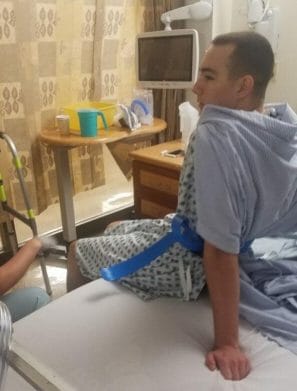
Standing, sitting, and any movement in between was agonizing. Browning walked with crutches or with a cane. After his trip to the emergency room, Browning was sent to the medical rehab platoon, where he would spend the next eight months.
In late December that year, two months into his stay at the medical platoon, a hip specialist informed him that it was unlikely he’d be able to stay in the military. Browning had a hard time accepting his new reality. He recalls thinking, “I’ll get better and I’ll go back to training.”
Having not finished his training and still a Marine recruit, Browning was given little access to the world outside of the medical rehab platoon.
“You don’t have your phone. You can’t watch TV,” Browning said.
He spent his time reading and doing crafts as he waited in six-week blocks to see the doctor again. Each time the doctor told him that they would check in another six weeks.
“That was awful. You don’t know how long you’re going to be there.”
Surgery
In March 2018 – five months into his stay at the medical platoon — Browning had his first surgery.
A left hip decompression was done. Calcium phosphate bone cement was injected into the femoral head cavity to provide structural support. A checkup two-weeks after the surgery showed that Browning’s hip was deteriorating quicker than initially thought. His doctor at the medical rehab platoon recommended a hip replacement. Administrative details and funding questions made Browning wait.
“There was a bit of a feud happening between the doctor and the marine corp, just because nobody in my position had ever got a hip replacement before and that’s a big-ticket item,” Browning said
Finally, in July 2018, Browning was moved from the medical rehab platoon to the Wounded Warrior Battalion where they would perform a total left hip replacement. In August, Browning had his hip replacement. His father flew out to stay with him during the surgery and help him navigate during his recovery. “It’s not like being completely fixed and mobile. That’s the struggle, knowing that it’s going to be different forever.”
Browning walked with assistance the day after his surgery. He used a walker for the first couple of weeks, progressed to a cane, and then eventually, was able to walk without assistance.
“The thing that really helped me improve was that it wasn’t painful all the time. It wasn’t bone on bone grinding anymore,” he said.
In December 2018 — after months of rehab — Browning’s doctor at the Wounded Warrior Battalion concluded that the recruit was no longer fit for service because of his hip replacement. Seventeen months after leaving home for boot camp, Browning left the Marine Corps and returned home to South Dakota where he was able to spend the holidays with his family.
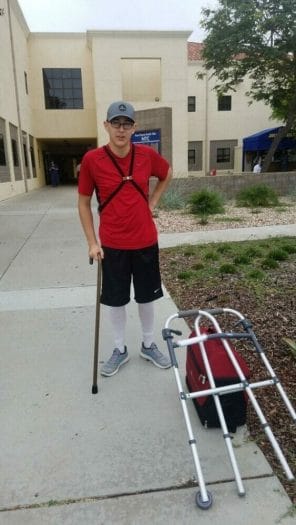
Life Now
Long term, Browning will need at least one more hip replacement, and possibly two more in his lifetime. As the plastic liner inside the hip joint wears down he will endure more frequent and severe pain.
Back in South Dakota, Browning can no longer enjoy the winter sports. Skiing is too dangerous for his hip. Even walking outside the house in the cold weather and potentially slipping on ice has become a terrifying possibility.
“I could have the anchor bust out of my femur, and it would be really painful. That’s something I have to watch for all the time,” he said.
Browning still has pain when standing for too long or sitting on a hard surface. The limited leg motion has made simple tasks more difficult, and even repositioning his leg while sleeping has been a challenge.
“I would hope that no one would have to go through what I’ve been through. There were a lot of things that could have gone better, and I wouldn’t be in this situation.”
But harder than the physical situation with his hip and the impact E. coli has had on his body is what it prevented him from being able to accomplish.
“I didn’t even get to finish boot camp, so they don’t even consider me a marine,” he said. “It’s very difficult not to have negative feelings. Given a chance, I would have worked for everything.”
Browning said he is thankful for his doctors and all they did to prevent the situation from becoming any worse, and for his family’s continued support.
He will turn 22 in March 2020 and plans on attending college in the fall to study business. He also hopes to get a pilot license and dreams of teaching flying.

Hunter’s Story courtesy of Food Safety News, by Jonan Pilet | January 13, 2020


